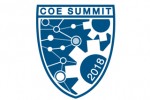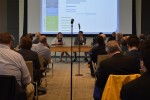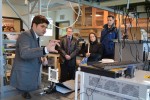News & Events
Research
ALERT invites you to the COE Summit on May 30-31, 2018! April 20, 2018

The Department of Homeland Security Centers of Excellence Summit 2018 will take place on May 30-31, 2018 at George Mason University in Arlington Virginia. ALERT would like to invite industry partners, researchers, homeland security operators, and other center community members to gather to collaborate on this year’s theme:
University Research & Development to Protect the Homeland
The summit will feature experts on relevant subject matter to discuss homeland security challenges, and facilitate collaboration between COE researchers and DHS leadership, as well as component end-users and industry participants. This year’s summit strives to showcase innovative research and development tools and other solutions to homeland security challenges, and to provide avenues to accelerate transition from research and development to operational use for those who protect the homeland.
The program includes panels with experts, a student poster and innovation showcase, demonstrations of tools and technology, opportunities for collaboration, and an address by William N. Bryan, Senior Official Performing the Duties of the Under Secretary for Science and Technology in the Department of Homeland Security.
To register and for more information on the Centers of Excellence Summit 2018, visit the summit’s website – www.cina.gmu.edu/coe-summit-2018
The COE Summit is sponsored by the United States Department of Homeland Security Centers of Excellence (COEs). The COE network is a consortium of hundreds of universities that conduct research and education to address homeland security challenges. ALERT is one of nine current Centers of Excellence sponsored by the Department of Homeland Security Office of University Programs.
Read MoreProfessor Rappaport Delivers “Electromagnetic Screening for Airport Security” Lecture February 22, 2018

February 22, 2018
ALERT Deputy Director and Northeastern University Electrical and Computer Engineering Distinguished Professor, Carey Rappaport, gave an invited lecture on February 10th in Princeton, New Jersey. The lecture was part of the Princeton Plasma Physics Laboratory’s Science on Saturday Lecture Series. Titled “Electromagnetic Screening for Airport Security,” it focused on designing an airport scanner using millimeter-wave radar technology that is more accurate and less expensive than the currently employed passenger scanners, and which will provide images that are so clear it will be unnecessary to have humans look at the images to determine threats. Science on Saturday features scientists, engineers, and other professionals that are conducting cutting-edge research, and draws hundreds of community members each week.
To learn more about the work Professor Rappaport leads at ALERT, visit our Bulk Sensors & Sensor Systems research page.
Student Spotlight: Muhammad Usman Ghani (Ph.D. Candidate, Boston University) January 29, 2018

January 29, 2018
Muhammad Usman Ghani, a Ph.D. candidate in Electrical and Computer Engineering at Boston University, is now in his second year working on ALERT research with Professor Clem Karl. His project, “Advanced Multispectral Computed Tomography (CT) Algorithms” (Project R4-C.1), involves developing learning based algorithms to improve the quality of imaging reconstructions for CT, and applies many areas of his interest, including, machine learning, computer vision, and statistical signal processing. When asked how he initially became interested in ALERT research, he describes an early interest in image processing and machine learning, and states, “The focus of ALERT research is on the cross-roads of inverse problems in imaging and image analysis. Additionally, it is an applied kind of research, which has always driven me. When Professor Karl introduced me to the ALERT research, I instantly became interested.”
A driving force behind his work is his desire to see real world technology applications address the large scale and ever present security challenges faced today. Usman’s goal is to solve various image acquisition and analysis problems, specifically in security scenarios, and is currently working with Professor Karl to draw on big data to develop new machine learning based methods to improve image reconstruction. Outside of research, Usman loves to travel and immerse himself in new cultures, learning about the world’s religions and eating amazing food. When asked where he sees himself in 5-10 years, he is sure research will be part of his career, but has yet to decide if he will stay in academia or work in industry. Either way, his passion for learning and exploring is sure to lead to a rich and exciting future!
“ADSA in Three Words” (Video) January 29, 2018
What began as a relatively small workshop (approximately 30 attendees) on the campus of Northeastern University (Boston, MA) in 2009, has evolved into an interactive biannual conference series with over 150 participants regularly. Viewed by participants as a “forum which brings together many different communities with a common goal of solving security challenges,” (ADSA17 participant quote), the ADSA (Advanced Development for Security Applications) Workshop series intends to facilitate collaboration and innovation between these communities.
At the last ADSA workshop (ADSA17 Workshop), ALERT asked several participants to sum up the biannual event in only three words. See what government, industry, and research participants had to say in “ADSA in Three Words.”
For users without YouTube access: ADSA in Three Words
Save the Date: Upcoming ALERT Spring Events! January 29, 2018

January 29, 2018
Throughout the year, ALERT offers events that provide great networking, training, and technology opportunities to you, our center stakeholders. We hope you put the following events on your spring calendar:
ASPIRE 2018 – April 26, 2018
The Annual Student Pipeline Industry Roundtable Event (ASPIRE) will be held on Thursday, April 26, 2018 from 12:00 – 5:00pm at Northeastern University in Boston, MA. The ASPIRE series is hosted by the ALERT (Awareness and Localization of Explosives-Related Threats) and Gordon-CenSSIS (The Bernard M. Gordon Center for Subsurface Sensing and Imaging Systems). ASPIRE provides an optimal setting for dialogue among members of the academic, industrial, and government communities and also provides networking opportunities for ALERT and Gordon-CenSSIS students looking for internships, co-op opportunities, and full-time jobs.
Great for Students, Government & Industry.
Fundamentals of Explosives Course at University of Rhode Island – May 1-3, 2018
ALERT researcher, Dr. Jimmie Oxley of the University of Rhode Island, will be holding a “Fundamentals of Explosives” course for professionals working in the Homeland Security Enterprise from May 1-3, 2018, with the option of taking a “Laboratory Analysis and Safety” or “Field Instrumentation and Testing” course on May 4, 2018.
The “Fundamentals of Explosives” course examines the chemistry of explosives, the physics of detonation waves, and their initiation, and the issues involved in safe handling and characterizing these. Explosive output and coupling to surroundings with specific application to structural response will be discussed. The course will also address terrorist bombings, the gathering, analysis, and interpretation of evidence, improvised explosives, and explosives detection. Lecturers are internationally known experts. More information about the available courses and registration can be found here.
Great for Students & First Responders.
ADSA18 Workshop – May 15-16, 2018
The Eighteenth Advanced Development for Security Applications (ADSA18) Workshop will be held on May 15-16, 2018 at Northeastern University in Boston, MA. The theme of the latest ADSA workshop is “Collection and Use of Metadata for Improving Aviation Security Systems.” In addition to the discussion of metadata, presentation topics will include behavior detection, cybersecurity, and DICOS (Digital Imaging and Communications in Security) standards for airport security.
The ADSA Workshop series has been convened by the DHS Center of Excellence (COE) for Awareness and Localization of Explosives-Related Threats (ALERT) since 2009. Originally named the “Algorithm Development for Security Applications” workshop series, ALERT changed the name of the workshop series following the ADSA10 Workshop in 2014 to reflect how the scope of these workshops have expanded and evolved beyond algorithms. Today, topics addressed in these workshops include energy sources (e.g. X-ray, neutrons), sensors (e.g. photon counting X-ray detectors, trace), concept of operations, hardening, deterrence, simulants, and testing. The ADSA Workshop series is intended to address research opportunities that may enable the development of next-generation systems and to facilitate collaboration and innovation between researchers from academia, national labs, and industry.
To read the proceedings from previous ADSA Workshops, check out ALERT’s collection of final reports.
Great for Researchers, Government & Industry.
U.S. Department of Homeland Security Centers of Excellence (COE) Summit 2018 – May 30-31, 2018
The U.S. Department of Homeland Security Centers of Excellence (COE) Summit 2018 will convene from May 30-31, 2018 at George Mason University in Arlington, VA. The theme of the summit will be “University Research and Development to Protect the Homeland” and intends to bring together representatives and researchers from the current DHS COEs and their stakeholders. The goals of the summit include providing subject matter experts to discuss current and future homeland security challenges; showcasing innovative R&D tools and solutions to homeland security challenges; facilitating collaboration between DHS COEs and end users; and providing avenues to accelerate the transition of R&D to reality for those who protect the homeland. For more details and to register visit: https://cina.gmu.edu/coe-summit-2018/
Great for Students, Researchers, Government & Industry.
Advanced Development for Security Applications for Customs and Border Protection Workshop (ADSA-CBP-01)
The first Advanced Development for Security Applications for Customs and Border Protection (ADSA-CBP-01) workshop will be held on June 20-21, 2018 at Northeastern University in Boston, MA. This workshop stems from the ALERT ADSA Workshop series. The ADSA-CBP-01 workshop is convened by the Department of Homeland Security (DHS) Center of Excellence (COE) for Awareness and Localization of Explosives-Related Threats (ALERT) at Northeastern University. ALERT is supported by the DHS Science and Technology and Customs and Borders Protection Office of Field Operations through the DHS Office of University Programs.
Great for Researchers, Government & Industry.
ADSA17: Providing Solutions for Aviation Security November 27, 2017

November 27, 2017
The Seventeenth Advanced Development for Security Applications (ADSA17) Workshop convened on October 17-18, 2017 at Northeastern University in Boston, MA. Participants from academia, industry, and government gathered to engage in dialogue related to the theme of the ADSA17 Workshop: “Systems Engineering of Aviation Security Systems.” Specific topics discussed included requirement specifications for systems and subsystems; the acquisition and use of metadata; assessment, management, and use of risk; and layered security.
The ADSA17 Workshop featured more than thirty presentations from subject matter experts and leaders from industry and government over the course of two days. Presentation topics included emerging technologies, such as sensors and algorithms; aviation cargo inspection; stakeholder perspectives; behavior detection; and deep learning.
ADSA17 participants shared their views on the value of the ADSA Workshop series. ALERT Thrust R4 (Video Analytics and Signature Analysis) Leader, Professor David Castañón (Boston University) stated, “For me, as an academic researcher, the most valuable asset is getting a sense of what industry wants to address and what the government feels that its primary problems are. That helps us match what we can do with what they perceive as the big problems. I think if you ask the question for different communities that are represented here, you would get very different perspectives on the value. Some are here for the networking aspect, some are here to get educated on what other people think are the real problems that they could address and business opportunities, and others are looking for technologies. As an academician, I’m asking myself: What is the next big problem we ought to be focusing on?”
Dr. Mark Witinkski, Vice President of the Chemical Analysis & Security Group at Pendar Technologies, shared his viewpoint as an industry participant, “I go to a lot of conferences, and this doesn’t feel like one. The quality of the research and the quality of what is being presented is every bit as good as you would see at the top conferences, but it has that workshop feel where you can interact during the presentations and really discuss things after the talks and during lunch. There is ample opportunity and emphasis placed on that. We’ve formed a few really important collaborations during those times and that probably wouldn’t have happened at a traditional conference.”
The DHS Center of Excellence (COE) for Awareness and Localization of Explosives-Related Threats (ALERT) has convened the ADSA Workshop series since 2009. Originally named the “Algorithm Development for Security Applications” workshop series, the name changed in 2014 following the ADSA10 Workshop to reflect how the scope of the workshop series has expanded beyond algorithms. The purpose of the ADSA Workshop series is to address research opportunities that may enable the development of next-generation systems and to facilitate collaboration and innovation between researchers from academia, national labs, and industry.
Presentations from the ADSA17 Workshop are available for viewing online: https://alert.northeastern.edu/transitioning-technology/adsa/final-reports-and-presentations/adsa17-presentations/
Final reports for all previous ADSA Workshops are also available online: https://alert.northeastern.edu/transitioning-technology/adsa/final-reports-and-presentations/
Student Researchers Selected for ALERT Professional Development Award November 27, 2017

November 27, 2017
Three ALERT student researchers have been selected to receive the first ALERT Professional Development Award in November 2017. The winners are Qi Feng, a Ph.D. student working with Prof. Stan Sclaroff at Boston University; Ashraful Islam, a Ph.D. student working with Prof. Richard Radke at Rensselaer Polytechnic Institute; and Abubakar Siddique, a Ph.D. student working with Prof. Henry Medeiros at Marquette University.
The ALERT Professional Development Award is intended to encourage ALERT students to participate in professional development activities throughout the year and to facilitate their future participation in networking and career development opportunities. ALERT selects up to three students each year to win a $1,500 stipend that can be used towards attendance at a professional or academic conference and/or to visit and collaborate with a lab related to their ALERT research project. This year, applications were accepted August through October 2017. More information about next year’s award cycle is forthcoming.
Rappaport Delivers IEEE Distinguished Lectures in Australia and New Zealand November 27, 2017

November 27, 2017
ALERT Deputy Director and Northeastern University Electrical and Computer Engineering Distinguished Professor, Carey Rappaport, delivered three IEEE Distinguished Lectures in Australia and New Zealand earlier this month. The IEEE Antennas and Propagation Society (AP-S) selected Professor Rappaport as a Distinguished Lecturer for 2017-2019. The IEEE AP-S Distinguished Lecturer Program sends experts, the Distinguished Lecturers, to visit active IEEE AP-S Chapters around the world and give talks on topics of interest and importance to the Antennas and Propagation community. Professor Rappaport gave the following talks during his recent visit to Australia and New Zealand:
- “Electromagnetic Sensing and Treatment of Living Things: Using Microwaves to Detect and Treat Disease in Humans and Trees” (Melbourne, Australia)
- “A High Gain Toroidal Reflector Antenna for Multistatic 3D Whole Body Millimeter-Wave Imaging” (Queenstown, New Zealand)
- “Multifocal Bootlace Lens Design Concepts” (Sydney, Australia)
On the value of being an IEEE Distinguished Lecturer, Professor Rappaport states, “The IEEE Distinguished Lecturer Program supports one of the fundamental precepts of academic research: extending the dissemination of knowledge and cutting-edge discovery to as wide an audience as possible. In presenting my team’s engineering work around the world, I have been able to help engineers extend their scientific awareness beyond their traditional themes, and occasionally outside their comfort zones. Although the travel commitment is time-consuming, it has been a great opportunity to meet people and exchange technical ideas.” Professor Rappaport will be delivering another IEEE Distinguished Lecture in January 2018 to the IEEE AP-S chapter in Orlando, Florida.
Professor Rappaport has been a Northeastern University faculty member since 1987, becoming a full professor in Electrical and Computer Engineering in July 2000, and receiving an appointment as a College of Engineering Distinguished Professor in 2011. Professor Rappaport has written over 400 technical journal articles and conference papers on various topics, including electromagnetic wave propagation and scattering computation, microwave antenna design, and bioelectromagnetics. He has also received two reflector antenna patents, two biomedical device patents, and four subsurface sensing device patents.
ALERT Researcher Awards & Accomplishments September 27, 2017

September 26, 2017
Professor Bouman Nominated for ACM Gordon Bell Prize
Professor Charles Bouman of Purdue University has been nominated for an ACM (Association for Computing Machinery) Gordon Bell Prize. Professor Bouman co-leads research on the ALERT project, “Toward Advanced Baggage Screening: Reconstruction and Automatic Target Recognition (ATR)” (Project R4-B.1), with the overarching goal of finding the best mapping method from X-ray data to a decision on the relative safety of individual bags in security settings, such as airport checkpoints. Professor Bouman and his research team study the reconstruction problem with the end goal of detection, while also designing algorithms for image analysis that can best exploit the improved image quality in iterative methods. Their aim is to reduce the false alarm rate without sensitivity loss in detection. They hope to eventually reduce security costs to the transportation industry.
The Gordon Bell Prize is awarded each year to recognize outstanding achievement in high-performance computing. The purpose of the award is to track the progress over time of parallel computing, with particular emphasis on rewarding innovation in applying high-performance computing to applications in science, engineering, and large-scale data analytics. Prizes may be awarded for peak performance or special achievements in scalability and time-to-solution on important science and engineering problems.
Professor Jose Martinez-Lorenzo Awarded $546K DOE Grant
Professor Jose Martinez-Lorenzo of Northeastern University was awarded a $546K grant from the Department of Energy (DOE) for “Fusing Thermoacoustic, Electromagnetic and Acoustic/Seismic Wave Fields for Subsurface Characterization and Imaging of Flow Transport.” According to the DOE, “The overarching goal of this research program is to gain knowledge on the theory and experimental validation of a new unified sensing and imaging methodology for coupling Electromagnetic (EM), Acoustic/Seismic (AC/S), and novel Thermoacoustic (TA) physical fields, which will be applicable to multi-physics and multi-scale material characterization and underground imaging of fluid flow in porous media.” This research will help Professor Martinez-Lorenzo build upon his work with ALERT, specifically Project R3-B.1 and Project R3-B.2.
Professor Otto Gregory Awarded Patent for Gas Sensor System
Professor Otto Gregory of the University of Rhode Island was awarded a patent for “Systems and Methods for the Detection of Compounds” on September 12, 2017. Triacetone-Triperoxide (TATP) is an explosive commonly used in improvised explosive devices (IEDs) and is very difficult to detect using conventional explosives detection techniques, because most of these techniques were developed for nitrogen-based chemistries, not peroxide-based chemistries. In addition, TATP readily sublimes at room temperature, meaning that it can only be found in relatively high concentrations in the vapor phase compared to other commonly found explosives used in IEDs. Professor Gregory’s invention provides a gas sensor system for detection of a compound that decomposes upon exposure to a metal oxide catalyst, and incorporates the exposure of the compound to a microheater, which allows accurate detection to occur at smaller concentrations. For more information on Professor Gregory’s research with ALERT, see Project R2-B.1.
Video: ALERT Undergrads Discuss their Research in Advanced Imaging Technology (AIT) September 27, 2017
ALERT Undergraduate Research in the AIT Lab at Northeastern University
Engineering undergraduates at Northeastern University (Jacob Londa, Daniel Castle, and Nikhil Phatak) describe their work on the ALERT AIT (Advanced Imaging Technology) project, which is led by ALERT Deputy Director, Prof. Carey Rappaport, a faculty member in the Electrical and Computer Engineering department at Northeastern.
Read More
